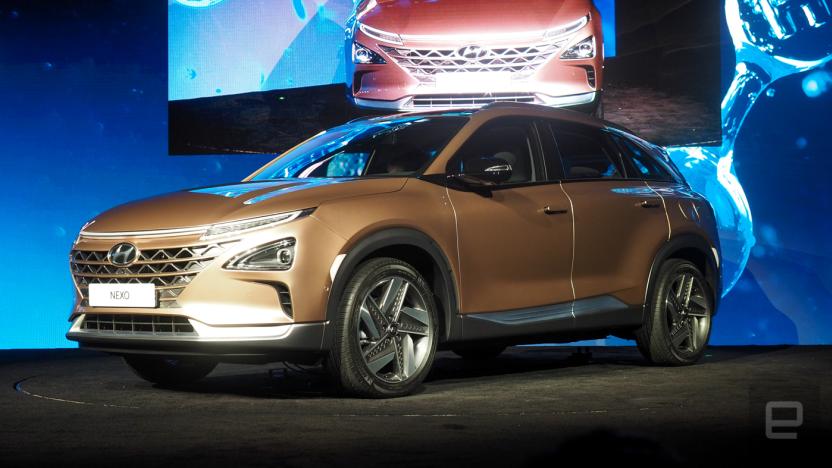FuelCellVehicles
Latest

Hyundai unveils its next generation fuel-cell vehicle
While electric cars and hybrids dominate the alternative vehicle headlines, automakers continue to hedge their bets with fuel cell vehicles. At CES, Hyundai unveiled its next offering, the Nexo fuel-cell SUV with a 350 mile range and a 55 MPGe rating. The new SUV will start arriving in California dealerships later this year.

Toyota's hydrogen car to sell on just eight lots come October
Toyota's new hydrogen-powered fuel cell vehicle (FCV), dubbed the Mirai, will be hitting dealer lots this October...all eight of them. The car company announced today that only select lots throughout California will actually be taking stock based on their previous advanced technology vehicle sales as well as the relative development of hydrogen infrastructure in their areas. The Mirai starts at $57,500, though with state and federal tax credits you're looking closer to $45,000 (plus free hydrogen for "up to three years"). You can check one out in person at San Francisco Toyota, Roseville Toyota, Stevens Creek Toyota, Toyota of Sunnyvale, Longo Toyota, Toyota Santa Monica, Toyota of Orange and Tustin Toyota. The company plans to produce just 200 units to start though it hopes to sell as many as 3,000 Mirai by the end of 2017.

What you need to know about hydrogen fuel cell vehicles
Damn the torpedoes (and Teslas)! Two of Japan's biggest automakers are about to make sizable wagers on a different kind of clean fuel tech: hydrogen power. Toyota will launch the $57,500 Mirai fuel cell vehicle (FCV, above) next year, while hydrogen veteran Honda will out a model in 2016. But wait, aren't EVs the last word in green cars? Fuel cell cars are EVs, in a way, but you can fill one up with hydrogen in five minutes rather than waiting hours for a charge. The only way to do that in an electric vehicle (EV) is by swapping the entire battery. So why is there exactly one production FCV available to buy today, but EVs everywhere? That's a tale of efficiency, fuel, pollution and politics.

Fuel cells get stronger, potentially cheaper with graphene, ITO
As the sustainable Juggernaut of fuel cell vehicles (FCV) powers ever forward, a group of scientists are cooking up ways to make the alternative energy source more durable and even cheaper. By combining graphene -- think pencil lead -- and indium tin oxide (ITO) nanoparticles, the team produced a catalytic material that is both stronger and more chemically active than the usual catalytic combo. Fuel cells typically use a chemical catalyst like platinum, sitting atop a base of black carbon or metal oxides, to break down oxygen and hydrogen gases, creating water in the process -- thing is, carbon is easily eroded by the resulting water, and metal oxides, while more stable, are less conductive. Using graphene -- which because of its porousness erodes less quickly -- in combination with the stable ITO and platinum nanoparticles, researchers have created what could be referred to as a super fuel cell -- a stronger, longer lasting, and potentially cheaper version of the alternative energy source. Unfortunately, without enough hydrogen filling stations, these super fuel cells won't come to anyone's rescue anytime soon.

Hyundai brings hydrogen vehicles to Europe, one free fleet at a time
Excited for the rise of hydrogen economies, but can't wait till 2015? If you work for the Norwegian, Swedish, Danish or Icelandic governments, you might get to see the future personally. Hyundai's signed a memorandum of understanding with the aforementioned four countries to deliver a test fleet of fuel cell electric vehicles, and the Nikkei Shimbun is reporting that the company will personally foot the (possibly quite reasonable) bill. Free hydrogen-powered SUV? Don't mind if we do!

FTA awards $16.6 million in grants for fuel cell bus research
While we were jealously hung up on South Korea's working electric bus system, Christmas apparently came early for a couple of lucky US fuel cell bus research projects -- in the form of $16.6 million in Federal Transit Administration grants. Pasadena based Calstart snagged almost $10.2 million and will funnel 70 percent of the funds to developing the first phase of a low-cost, longer lasting fuel cell power system. Calstart will then spend its remaining $2.9 million in partnership with the Chicago Regional Transit Authority to develop and test the viability of fuel cell bus fleets in cold climates. The Center for Transportation and the Environment in Atlanta was the other project to hit the federal money gravy train. It received a hefty $6.4 million to spread across six different projects that dabble in everything from developing fast-charging 35-foot fuel cell buses, to similar lithium ion versions, to improving existing hybrid bus platforms. Federal pork for fuel cell DSLR development regrettably missed the cut. For the full scoop hit up the press release after the break.



